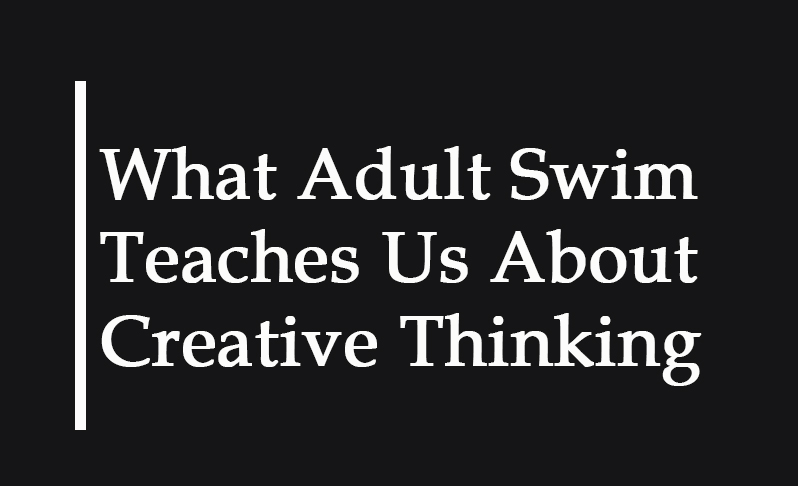For those not in the know, Adult Swim is not that time period down at your local Y when everyone younger than 18 is cleared from the pool. Instead, Adult Swim is a channel that replaces the Cartoon Network at night. What’s remarkable about this channel (no, not it’s juvenile humor) is that while viewership among 18-34-year-olds has declined this past year, Adult Swim, with its cartoon-laden lineup, ranks number one with this age group and has for the past ten years with this “toons for millennials” formula.
Why such success? According to an article in our favorite newspaper, The Wall Street Journal, Adult Swim has mastered the process of “How To Run a Creative Hothouse” (13 March 2015). “The creative freedom it offers is also attracting talent it couldn’t otherwise afford” (D1). In contrast to over-controlling and layered network hierarchies, Adult Swim employs fewer executives, discovers creative people, then backs off and allows them to exhibit their creativity.
In essence, Mike Lazzo, creative chief at Adult Swim, allows his creators to enter the pool, and it’s sink or Adult Swim. His mentor at TBS, Ted Turner, Lazzo recalls, used a different metaphor to respond to employee proposals: “here’s your rope (enough to hang you or get your idea off the ground)(D2). To develop the creative hothouse that is Adult Swim, Lazzo also developed six guidelines for successful creative thinking:
- “Don’t swing for the fence.” According to Lazzo, the financial pressure to succeed degrades creative thinking into its most conservative ideas. He wishes to encourage risk, believing “If we purely by luck stumble into something good, we’ll feed it” (D2).
- “Do be humble.” When working in collaboration, Lazzo believes egos have to be diffused. One of his favorite methods is humor.
- “Don’t pretend you like something when you don’t.” While brainstorming necessitates letting ideas, even bad ones, live for a while, Lazzo knows that eventually an honest assessment is needed, even if it’s blunt. Furthermore, creative minds don’t need to be constantly told how good they are.
- “Don’t get hung up on hierarchy and protocol.” Ideas can come from anyone. Assess the idea, not the creator. Ideas from the bottom can be just as valuable as those from the top.
- “Do trust creators who are super passionate about an idea, even if you have misgivings about it.” As we point out in Achieving Excellence in Teaching (2014), passion remains the disposition most needed by a teacher, and, according to Lazzo, the same seems true for creators. Passion is intimately associated with believability and trust.
- “Do shield creators from other suits.” Creators, Lazzo finds, don’t need to know exactly what others in power think of their creations. All creators function well in sandboxes.
As we note in Lazzo’s fifth guideline, Lazzo’s advice can be effectively applied to other fields, especially teaching. In fact, his comments and guidelines fit into creative pedagogy quite well:
- Encourage risk. Allow students to explore unchartered waters without immediately providing advice. Reward baby steps.
- Model ego removal. Sometimes in discussions students arrive at remarkable insights and even idea glimmers that the instructors may not have thought about. Show students how to combine your idea with theirs without ownership tags attached to the ideas.
- Tell the truth. After developing an environment that allows for novel ideas to come out, when it comes time for the useful or assessment phase, the instructor should offer candid comments. Encourage idea generation, but discourage less than truthful evaluations of those ideas.
- Be passionate. Passion not only sells ideas, but the entire person as well as the creative process and product. If instructors aren’t passionate about what they profess, how can they avoid a roomful of Negative Nells and Debbie Downers?
In short, creative instructors and instructors of creative thinking can take “swimming” lessons from a variety of sources.
Author
 Dr. Russell Carpenter is director of the Noel Studio for Academic Creativity and Program Director of the Minor in Applied Creative Thinking at Eastern Kentucky University. He is also Assistant Professor of English. Dr. Carpenter has published on the topic of creative thinking, among other areas, including two texts by New Forums Press. In addition, he has taught courses in creative thinking in EKU’s Minor in Applied Creative Thinking, which was featured in the New York Times in February 2014. Meet Russell.
Dr. Russell Carpenter is director of the Noel Studio for Academic Creativity and Program Director of the Minor in Applied Creative Thinking at Eastern Kentucky University. He is also Assistant Professor of English. Dr. Carpenter has published on the topic of creative thinking, among other areas, including two texts by New Forums Press. In addition, he has taught courses in creative thinking in EKU’s Minor in Applied Creative Thinking, which was featured in the New York Times in February 2014. Meet Russell.



